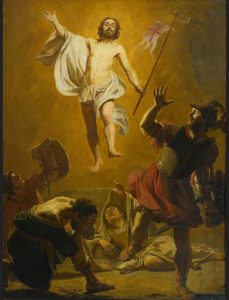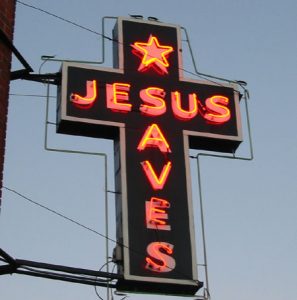This sermon was first preached on Easter Sunday, 2001, at St. Francis of Assisi in the Pines Episcopal Church, Stilwell, Kansas, where I was rector from July 1993 to June 2003. I had thought it lost when that parish abandoned its internet domain after I left that position. However, at the urging of a friend, I searched for it on the Internet Archive’s “wayback machine,” and was surprised to find it. I have updated some of the references and corrected some mistakes to publish it here. I have always thought it a pretty good sermon, and I guess others have thought so, too: in the course of researching sources to update the footnotes, I found that a rather large chunk of it had been reproduced in full, without attribution, as the pastor’s 2019 Easter letter in the newsletter of a Roman Catholic parish in Scotland.[A] (As my fellow Anglican cleric Charles Caleb Cotton wrote in 1824 – and Oscar Wilde later quoted and expanded – “Imitation is the sincerest [form] of flattery.”[B])
 Easter is a joke. Amen.
Easter is a joke. Amen.
(The Preacher steps out of the pulpit, perhaps even returns to his chair, then returns to the pulpit.)
OK … I guess I should explain that. What is a “joke”? Princeton University’s WordNet Dictionary says, in one of its definitions, that a joke is an “activity characterized by good humor.”[1] Can you think of a better way to characterize the resurrection of Jesus than as an “activity characterized by good humor”? The Resurrection of Jesus of Nazareth was God’s activity of the highest and best humor!
I wrote in our newsletter, The Canticle, that the Sunday we call “Easter” is really not a separate feast day; it is the third part of a three-day celebration that begins at sundown on the previous Thursday, the day we call “Maundy.” This three-day celebration is called by an ancient Latin name, “the Triduum.” The Triduum is a single celebration in three acts. We have arrived at Act Three in the drama of redemption.
Continue reading
 Y’all know who John Wesley is, or was, I’m sure. The Anglican priest who founded Methodism? My paternal grandparents were Methodists and they really tried to make me into one but, for some reason, it didn’t stick. To this day when Evelyn and I visit a Methodist church, I will often turn to her as we are leaving and say, “There’s a reason I’m not a Methodist.”
Y’all know who John Wesley is, or was, I’m sure. The Anglican priest who founded Methodism? My paternal grandparents were Methodists and they really tried to make me into one but, for some reason, it didn’t stick. To this day when Evelyn and I visit a Methodist church, I will often turn to her as we are leaving and say, “There’s a reason I’m not a Methodist.”  Easter is a joke. Amen.
Easter is a joke. Amen. While making a presentation at a conference about teaching English as a second language, an expert in the field remarked that one of the difficulties is that there are many instances in English when a double-negative renders positive meaning and this is confusing for non-English speakers. “It’s fortunate,” she said, “there’s no way in English that a double positive can convey negative meaning.”
While making a presentation at a conference about teaching English as a second language, an expert in the field remarked that one of the difficulties is that there are many instances in English when a double-negative renders positive meaning and this is confusing for non-English speakers. “It’s fortunate,” she said, “there’s no way in English that a double positive can convey negative meaning.”  Christology is one of those odd words of the Christian tradition that one doesn’t hear much in church but which one hears a lot in academic circles. Christology is defined as “the field of study within Christian theology which is primarily concerned with the ontology and person of Jesus as recorded in the canonical Gospels and the epistles of the New Testament.”
Christology is one of those odd words of the Christian tradition that one doesn’t hear much in church but which one hears a lot in academic circles. Christology is defined as “the field of study within Christian theology which is primarily concerned with the ontology and person of Jesus as recorded in the canonical Gospels and the epistles of the New Testament.” Our kids this week have been “Shipwrecked,” but they’ve also been “rescued by Jesus.”
Our kids this week have been “Shipwrecked,” but they’ve also been “rescued by Jesus.”

